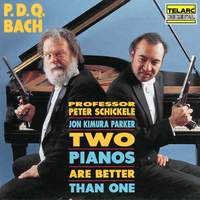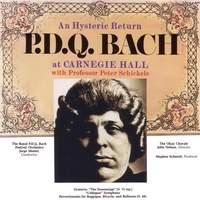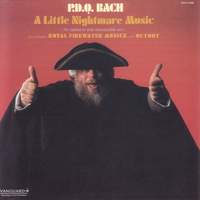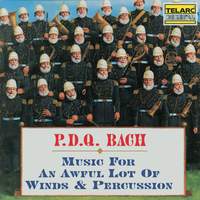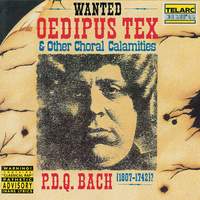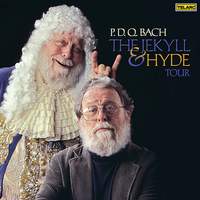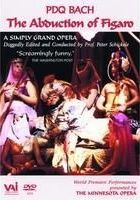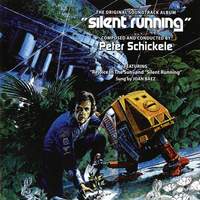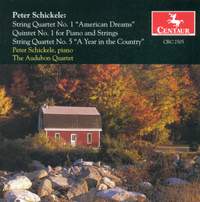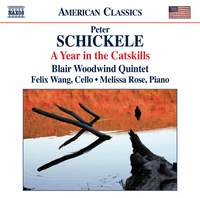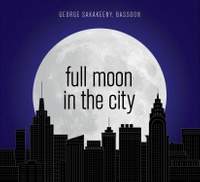Obituary,
PDQ Bach (2024-1742?)
News broke last week of the death of the last scion of the great Bach dynasty, PDQ Bach.
An astonishing innovator for his time, PDQ Bach’s compositions show an almost preternatural resemblance to a great number of better-known works from many different periods, at least as far as their titles are concerned - The Abduction of Figaro, The Desecration of the House, the Fanfare for the Common Cold and many, many more indicate that there was far more to this composer than meets the eye.
Born in Leipzig on April 1st, 1742, PDQ Bach is described as the ‘youngest and oddest’ of the children of Johann Sebastian. His musical appetites were unprecedentedly wide-ranging, encompassing not merely instruments considered unusual within the classical canon (the bagpipes and slide-whistle) but instruments that are barely instruments at all, such as the pastaphone and tromboon - and even fictional devices such as the hardart (which had to be created from scratch for a performance of his work) and the left-handed sewer flute. PDQ Bach’s penchant for composing for nonexistent instruments places him arguably in the company of such outside-the-box thinkers as John Cage and M C Escher, or of Luigi Serafini, the compiler of a highly detailed 1981 encyclopedia of a fantastical and impossible world of his own invention.
PDQ Bach’s three major periods - the Initial Plunge, Soused Period and Contrition - have consistently eluded pinning-down by musicologists and in many ways his style remains reasonably consistent across all three, that is to say eclectic to an almost unbelievable degree. As well as the main stream of the Germanic Baroque and Classical repertoire, influences on his music include Pushkin and Dargomïzhsky (in The Stoned Guest), Philip Glass (Prelude to ‘Einstein on the Fritz’) and Stravinsky (Oedipus Tex), though as ever with such a polymathic figure it is difficult to truly say who influenced whom.
PDQ Bach leaves no known descendants, but is survived by his extensive output of compositions; some remain lost, or in a few cases were intended never to be heard, such the posthumous Steintot Requiem, but others have been recorded over the years following the tireless work and advocacy of the late Professor Peter Schickele. A short list of recordings can be found at the bottom of this article.
Johann Peter Schickele (1935-2024)

The above article, of course, reflects the most widely-known facet of the composer, bassoonist, educator and parodist Johann Peter Schickele (1935-2024), regarded with affection by the classical world for many decades, who died on Tuesday at his home in the north of New York state aged 88.
Born in Iowa to parents who had moved there from Europe, Schickele studied composition at the Juilliard School and made forays into scoring film music as well as folk music - writing music for Joan Baez and scoring the 1972 environmentalist sci-fi adventure Silent Running.
In the mid-1960s Schickele began to acquire the taste for parody that would blossom into the character of PDQ Bach. The character developed over the years, and included stage collaborations with some of the finest musicians of his time (memorably Itzhak Perlman, who participated in a performance of the Konzertshtick for Two Violins Mit Orchestra). He incorporated so much physical slapstick into his performances that, when confined to a wheelchair by illness in later years, audiences initially assumed that his unexpectedly rolling onto stage, rather than striding, bouncing or descending from a rope as he was inclined to do, was part of the act.
PDQ Bach’s fictional catalogue ranged from straightforward puns, designed to elicit the unique mixture of pleasure and pain that only a truly awful pun can produce (the Okay Chorale from Oedipus Tex being a prime example), to satirical juxtapositions of sanctified ‘high art’ with everyday American life (Iphigenia in Brooklyn, Hansel and Gretel and Ted and Alice). Much of the comedy, too, had a musical component to it, designed to appeal to those at least partly ‘in the know’ - deliberately bad compositions including inexplicably meandering keys, frustratingly poorly-resolved cadences and more.
His contemporaries at Juilliard, too, were not safe from his comic barbs - Philip Glass being a particular target of his wit. This evidently went in both directions - when creating the multi-instrumental device that would take the role of the ‘hardart’ in the Concerto for Horn and Hardart, Glass and his colleagues decided to make it a transposing instrument without telling Schickele, forcing him to sight-transpose the music in the performance. Although Schickele excelled at the Juilliard and does not seem to have been unhappy there, he later developed a desire - mischievous, yet also sincere - to prick balloons and deflate egos, both there and elsewhere, through his satire.
It is one thing to come up with a long list of musical titles that are little more than off-the-cuff wisecracks - however smart - but it is quite another to follow through on the joke with a full-length composition. Schickele’s musical background and indisputable talent allowed him to do just that, as several albums of his ‘PDQ Bach’ compositions prove. The 1712 Overture, reimagining Tchaikovsky’s nationalistic 1812 but substituting Yankee Doodle and Pop Goes the Weasel for God save the Tsar and La Marseillaise, is a prime example - lasting nearly twelve minutes, it is a fully-fledged parodical work, worked through in detail in a manner reminiscent of Dudley Moore’s Beethoven Sonata parody skit.
It would not have been possible for Schickele to do all this had he not been, as well as a rare comedic wit, a phenomenally accomplished composer. He has hundreds of ‘real’ compositions to his name which testify to these abilities, though relatively few have been recorded. Due to some confusion deep within the complex web of databases and computer systems that underpins the 'supply chain' for digital recordings, many indeed are tagged erroneously as being composed by PDQ Bach - something which might perhaps itself have brought a smirk to Schickele’s face. An album of his beautiful and highly approachable chamber music came out on Centaur Records in the early 2000s, while a concerto for his own instrument, the bassoon, was recorded by George Sakakeeny a few years ago - not to be confused with PDQ Bach’s Concerto for Bassoon vs. Orchestra, S.88 - and exemplifies Schickele’s easy-going, jazz-infused, tuneful style.
It’s undeniable that of the two composers named in this obituary, PDQ Bach is by far the better-known. It isn’t clear how Schickele felt about his creation overshadowing him (the ‘Hyde’ to his ‘Jekyll’, as the title of one of his albums suggests); the New York Times wryly noted that PDQ Bach has won four Grammy Awards, while Peter Schickele has only won one. Certainly in the 1990s he took a deliberate break from the PDQ Bach character and hosted a radio show (‘Schickele Mix’) discussing classical music, though by the end of the decade PDQ Bach was back again.
What can’t be denied is that Schickele’s inventiveness, his knowing wit and his gadfly-like refusal to respect the often stuffy hagiography of the classical canon have brought joy to countless listeners, and that his non-parodical ‘proper’ music has a melodious, distinctively American inventiveness to it that is a delight to listen to. The world is a duller and less funny place without him.
Peter Schickele is survived by his wife (the poet Susan Sindall), his children Matt and Karla (both musicians), and two grandsons.
A selected discography of his non-PDQ Bach compositions is further down the page.
PDQ Bach - a selected discography
Professor Peter Schickele (piano), Jon Kimura Parker (piano), The New York Pick-up Ensemble, Jorge Mester
Available Formats: CD, MP3, FLAC
Peter Schickele
Available Formats: MP3, FLAC
Turtle Mountain Naval Base Tactical Wind Ensemble, Peter Schickele
Available Formats: CD, MP3, FLAC
Grandmaster Flab and the Hoople Funkharmonic
Available Formats: CD, MP3, FLAC
Peter Schickele (enabler), Michael Eaton (off-colorata soprano) & David Dusing (tenor profundo), Armadillo Quartet
Available Formats: CD, MP3, FLAC
Chorus, Corpse de Ballet, and Orchestra of the Minnesota Opera, Peter Schickele
Available Format: DVD Video
Peter Schickele - a selected discography
Peter Schickele, Joan Baez
Available Formats: MP3, FLAC
Peter Schickele (piano), Audubon Quartet
Available Formats: MP3, FLAC
Felix Wang (cello) & Melissa Rose (piano), Blair Woodwind Quintet
Available Formats: CD, MP3, FLAC
George Sakakeeny (bassoon), Oberlin Contemporary Music Ensemble, Oberlin Sinfonietta, Oberlin Orchestra, Timothy Weiss, Raphael Jiménez
Available Formats: MP3, FLAC, Hi-Res FLAC


